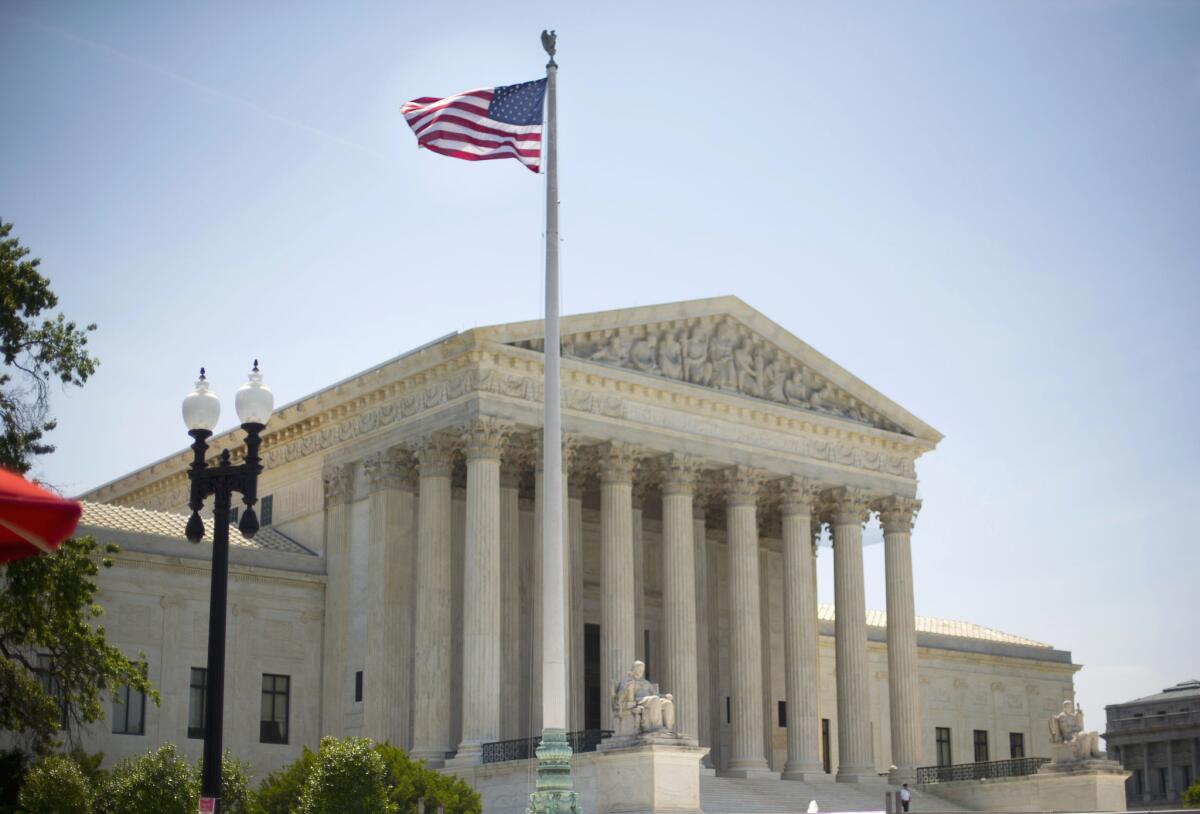Disgruntled inventor’s $500-million verdict against California tax collectors cut to $50,000

The Supreme Court building in Washington.
Reporting from Washington — The Supreme Court has shielded California and its taxpayers from “hostile” juries in neighboring Nevada who have been willing to hand down big verdicts on behalf of those who fled California in search of lower taxes.
The 6-2 decision threw out of most of a $500-million verdict won by a disgruntled inventor who left for Nevada decades ago and then sued California’s tax collectors for harassment.
Nevada’s willingness to uphold such big verdicts against California “reflects a policy of hostility ... to a sister state,” said Justice Stephen G. Breyer.
The decision upheld $50,000 of the once huge verdict -- just 0.01% of the original total -- in favor of Gilbert Hyatt, an inventor who said he was hounded and harassed by California tax collectors after he left the state in either 1991 or 1992.
The exact date was significant because Hyatt had been awarded a patent for an early microchip and stood to gain millions of dollars in royalties.
California’s auditors said Hyatt did not move from California until April 1992, and they said he owed the state more than $10 million in taxes and penalties.
Hyatt in turn sued the Franchise Tax Board of California in a Nevada court and contended agents had gone through his private mail and his garbage, and referred to him in anti-Semitic terms.
See more of our top stories on Facebook >>
After years of litigation, a Nevada jury ruled for Hyatt and awarded him compensation and damages of nearly $500 million. The Nevada Supreme Court upheld the verdict, but reduced the damages to $1 million.
Lawyers for California appealed to the Supreme Court last year and argued that the state should be immune from being sued in the courts of another state.
They said the court should overrule an earlier decision that allowed such suits and rule that states have a “sovereign immunity” from such claims.
Breyer said Tuesday the justices had split 4-4 on that issue, and therefore could not rule in California’s favor.
Instead, they agreed with the state’s fallback argument that states must follow an equal treatment rule when dealing with other states. Nevada allows suits against its tax collectors, but limits damages to $50,000.
Rather than treat California the same way it treats suits against its own state, “Nevada has attempted to announce a special and discriminatory rule that it would apply only to sister states,” Breyer said in court Tuesday.
Justices Anthony M. Kennedy, Ruth Bader Ginsburg, Sonia Sotomayor and Elena Kagan joined Breyer’s opinion, while Justice Samuel Alito concurred in the outcome.
Chief Justice John G. Roberts Jr. dissented and said the Constitution’s “Full Faith and Credit” clause does not promise fair treatment to other states. Justice Clarence Thomas agreed with him.
On Twitter: @DavidGSavage
------------
FOR THE RECORD
April 20, 7:35 p.m.: An earlier version of this article incorrectly stated that $50,000 was 1% of the original $500-million verdict. It is 0.01%.
------------
ALSO
The wild schemes people will use to commit tax fraud
5 dead, thousands without power as Houston flooding continues
Appeals court overturns Virginia school’s transgender bathroom rule
More to Read
Sign up for Essential California
The most important California stories and recommendations in your inbox every morning.
You may occasionally receive promotional content from the Los Angeles Times.











